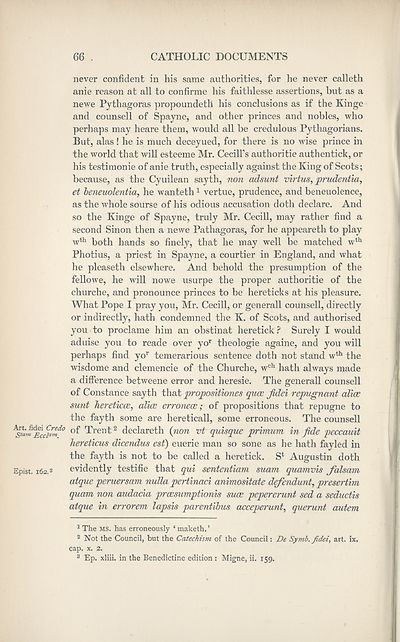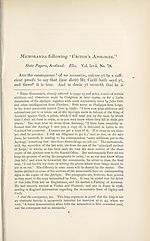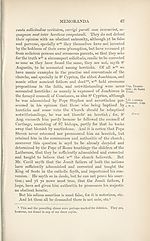Series 1 > Miscellany of the Scottish History Society (First volume)
(159) Page 66
Download files
Complete book:
Individual page:
Thumbnail gallery: Grid view | List view

CATHOLIC DOCUMENTS
66 .
never confident in his same authorities, for he never calleth
anie reason at all to confirme his faithlesse assertions, but as a
newe Pythagoras propoundeth his conclusions as if the Kinge
and counsell of Spayne, and other princes and nobles, who
perhaps may heare them, would all be credulous Pythagorians.
But, alas ! he is much deceyued, for there is no wise prince in
the world that will esteeme Mr. Cecill’s authoritie authentick, or
his testimonie of anie truth, especially against the King of Scots;
because, as the Cyuilean sayth, non adsunt virtus, prudentia,
et beneuolentia, he wanteth1 vertue, prudence, and beneuolence,
as the whole sourse of his odious accusation doth declare. And
so the Kinge of Spayne, truly Mr. Cecill, may rather find a
second Sinon then a newe Pathagoras, for he appeareth to play
wth both hands so finely, that he may well be matched wth
Photius, a priest in Spayne, a courtier in England, and what
he pleaseth elsewhere. And behold the presumption of the
fellowe, he will nowe usurpe the proper authoritie of the
churche, and pronounce princes to be hereticks at his pleasure.
What Pope I pray you, Mr. Cecill, or generall counsell, directly
or indirectly, hath condemned the K. of Scots, and authorised
you to proclame him an obstinat heretick ? Surely I would
aduise you to reade over yor theologie againe, and you will
perhaps find yor temerarious sentence doth not stand wth the
wisdome and clemencie of the Churche, wch hath always made
a difference betweene error and heresie. The generall counsell
of Constance sayth that propositiones quce Jidei repugnant alias
sunt hereticce, alias erroneae; of propositions that repugne to
the fayth some are hereticall, some erroneous. The counsell
r^ren^2 declareth {non vt quisque primum in fide peccauit
hereticus dicendus est) euerie man so sone as he hath fayled in
the fayth is not to be called a heretick. S* Augustin doth
Epist. 162.3 evidently testifie that qui sententiam suam quamvis falsam
atque peruersam nulla pertinaci animositate defendunt, presertim
quam non audacia prassumptionis suae pepererunt sed a seductis
atque in errorem lapsis parentibus acceperunt, querunt autem
1 The ms. has erroneously ‘maketh.’
2 Not the Council, but the Catechism of the Council: De Symb. Jidei, art. ix.
cap. x. 2.
3 Ep. xliii. in the Benedictine edition : Migne, ii. 159.
66 .
never confident in his same authorities, for he never calleth
anie reason at all to confirme his faithlesse assertions, but as a
newe Pythagoras propoundeth his conclusions as if the Kinge
and counsell of Spayne, and other princes and nobles, who
perhaps may heare them, would all be credulous Pythagorians.
But, alas ! he is much deceyued, for there is no wise prince in
the world that will esteeme Mr. Cecill’s authoritie authentick, or
his testimonie of anie truth, especially against the King of Scots;
because, as the Cyuilean sayth, non adsunt virtus, prudentia,
et beneuolentia, he wanteth1 vertue, prudence, and beneuolence,
as the whole sourse of his odious accusation doth declare. And
so the Kinge of Spayne, truly Mr. Cecill, may rather find a
second Sinon then a newe Pathagoras, for he appeareth to play
wth both hands so finely, that he may well be matched wth
Photius, a priest in Spayne, a courtier in England, and what
he pleaseth elsewhere. And behold the presumption of the
fellowe, he will nowe usurpe the proper authoritie of the
churche, and pronounce princes to be hereticks at his pleasure.
What Pope I pray you, Mr. Cecill, or generall counsell, directly
or indirectly, hath condemned the K. of Scots, and authorised
you to proclame him an obstinat heretick ? Surely I would
aduise you to reade over yor theologie againe, and you will
perhaps find yor temerarious sentence doth not stand wth the
wisdome and clemencie of the Churche, wch hath always made
a difference betweene error and heresie. The generall counsell
of Constance sayth that propositiones quce Jidei repugnant alias
sunt hereticce, alias erroneae; of propositions that repugne to
the fayth some are hereticall, some erroneous. The counsell
r^ren^2 declareth {non vt quisque primum in fide peccauit
hereticus dicendus est) euerie man so sone as he hath fayled in
the fayth is not to be called a heretick. S* Augustin doth
Epist. 162.3 evidently testifie that qui sententiam suam quamvis falsam
atque peruersam nulla pertinaci animositate defendunt, presertim
quam non audacia prassumptionis suae pepererunt sed a seductis
atque in errorem lapsis parentibus acceperunt, querunt autem
1 The ms. has erroneously ‘maketh.’
2 Not the Council, but the Catechism of the Council: De Symb. Jidei, art. ix.
cap. x. 2.
3 Ep. xliii. in the Benedictine edition : Migne, ii. 159.
Set display mode to:
![]() Universal Viewer |
Universal Viewer | ![]() Mirador |
Large image | Transcription
Mirador |
Large image | Transcription
Images and transcriptions on this page, including medium image downloads, may be used under the Creative Commons Attribution 4.0 International Licence unless otherwise stated. ![]()
| Scottish History Society volumes > Series 1 > Miscellany of the Scottish History Society (First volume) > (159) Page 66 |
|---|
| Permanent URL | https://digital.nls.uk/127082769 |
|---|
| Attribution and copyright: |
|
|---|
| Description | Over 180 volumes, published by the Scottish History Society, containing original sources on Scotland's history and people. With a wide range of subjects, the books collectively cover all periods from the 12th to 20th centuries, and reflect changing trends in Scottish history. Sources are accompanied by scholarly interpretation, references and bibliographies. Volumes are usually published annually, and more digitised volumes will be added as they become available. |
|---|


